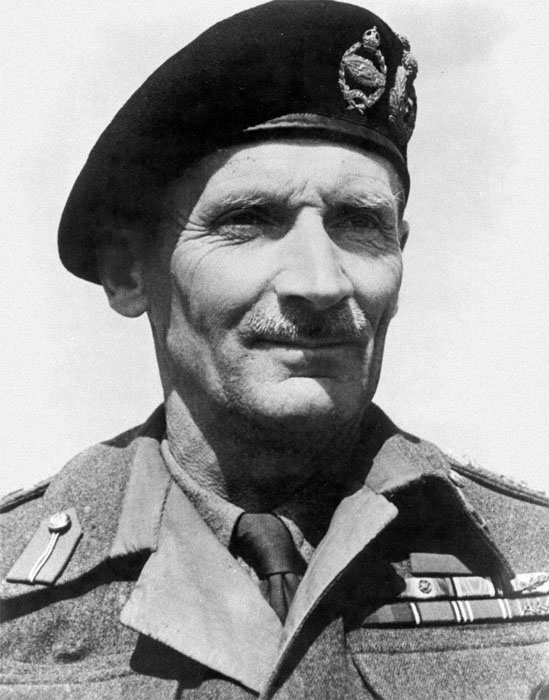Field Marshal Bernard Montgomery
Field Marshal Bernard Montgomery was a British General in World War Two who won a decisive victory at El Alamein in North Africa and played an important role in the D-Day Landings.
Born in 1887, Montgomery was schooled at St. Paul’s School and Sandhurst. In 1908 he gained his first commission in the Royal Warwickshire Regiment. Montgomery served on the Western Front during World War One. In 1914 he was awarded a distinguished service order after he was severely wounded in France. He was promoted to the rank of brigade major in 1915 and subsequently fought at the Battle of Arras in April-May 1917 and the Battle of Passchendaele in Autumn 1917. By the end of the war he was a General staff Officer.
Montgomery stayed in the army after the war and by 1938 had been promoted to the rank of major-general.
When World War Two broke out, Montgomery commanded the 3rd Division that journeyed to Belgium as part of the BEF. This division was evacuated in 1940 at Dunkirk. When Montgomery returned to England he raised the War Office’s hackles by repeatedly criticising BEF leaders. He paid for his truculence when he was briefly demoted to divisional command, but he was quickly brought back into the fold. He became an acting lieutenant-general in July 1940.

In August 1942 Montgomery replaced Auchinleck as commander of the Eighth Army in the Western Desert, afterAuchinleck’s first designated successor William Gott died in a plane crash. Montgomery made a great effort to meet his soldiers - not like a lot of senior officers. He repudiated many of the perks of his senior rank: his command base was a large luxury North African house, but instead he lived in a caravan in the garden. He was teetotal and never smoked, but he ensured his men were able to have cigarettes.
Montgomery’s victory at the Second Battle of El Alamein in 1942 turned the tide of the war in North Africa. In the wake of the battle Montgomery was promoted to the rank of full general. Rommel launched more attacks in March 1943, but Montgomery successfully stalled this offensive. The Germans retreated and eventually left North Africa in May 1943.
Montgomery then helped plan the Allied invasion of Sicily, and fought in the invasion of Italy as commander of the 8th army. He grew irritated by the disorganised Allied strategy and was pleased to leave in December 1943.
On his return to England Montgomery helped plan Operation Overlord, the invasion of Normandy which would start with the D-Day landings. Montgomery was in charge of all of the 21st army group. This force was tasked with being responsible for most of the German forces at Normandy - enabling the American Twelfth Army Group to move a lot further into France. Montgomery then favoured a big rush on Berlin via the Ruhr, but the Allied Supreme Commander, Dwight Eisenhower overruled this. Montgomery and Eisenhower both had a solid professional relationship, however ‘Monty’ sometimes disagreed with the future US President’s overall strategy.
Montgomery was promoted to the rank of field marshal in September 1944. Leading the 21st Army Group, he took the important port of Antwerp. However he also commanded the failed Allied attempt to bridge the Rhine at Arnhem.
When the Germans launched a surprise counter-attack in December 1944 (the Battle of the Bulge) Allied troops were split up and in disarray. Montgomery is credited with staying calm, reorganizing Allied Troops and formulating a coherent battle plan so that they could fight back successfully.
Montgomery’s group crossed over the River Rhine on 24 March 1945, and he accepted the formal German military surrender in the Netherlands, Denmark and North-West Germany on 4 May 1945.
When the war ended, Montgomery served as Chief of the Imperial General Staff and then as Deputy Supreme Commander of NATO forces in Europe. For his services in the war he was made a viscount in 1946. He died in 1976.
MLA Citation/Reference
"Field Marshal Bernard Montgomery". HistoryLearning.com. 2026. Web.
